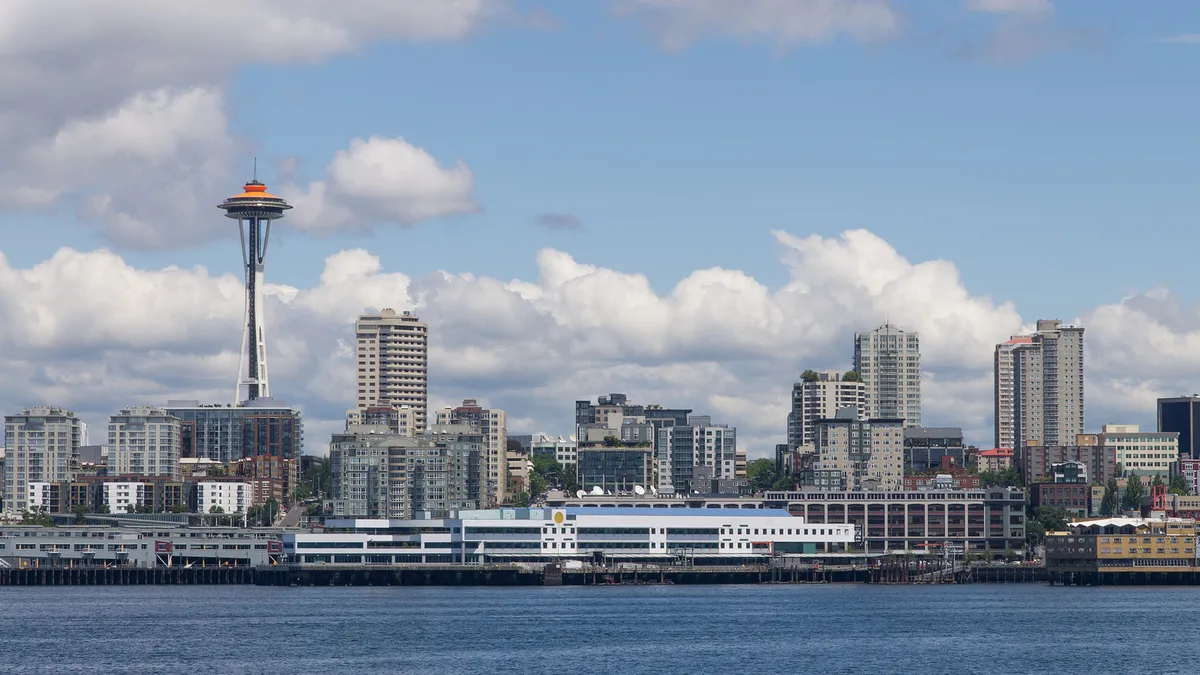UPDATE: May 1, 2019: Washington Gov. Jay Inslee signed HB 1543 into law on Monday, according to a tweet by Washington Department of Ecology Director Maia Bellon.
Dive Brief:
- Washington's Department of Ecology has proposed state legislation to help stabilize a 50% recycling rate "at risk of buckling" under pressure from China's scrap import policies. "Failing to act may provide a path to further weaken the system as bales of sorted material continue to pile up or are thrown away," the proposal reads.
- If passed, SB 5545 and companion bill HB 1543 would authorize the creation of a Recycling Development Center to incentivize new companies to process recyclable materials and develop more local end markets. An advisory board (which would include recycling industry representatives) would guide the center's activities.
- Ecology would also be tasked with creating and implementing a statewide contamination reduction and outreach plan by July 2020. Local jurisdictions would be required to develop their own plans, or choose to follow the state's, by July 2021.
Dive Insight:
Last year, Ecology raised red flags about the effects China's import restrictions were having on the U.S. recycling markets — but some critics say the discussions came too late, and that Washington state was already in the midst of a recycling crisis. While Ecology initially asked local governments to avoid making any permanent changes to programs or policies, this soon became impractical. A number of jurisdictions have raised rates, dropped materials from recycling programs or considered eliminating recycling altogether.
Now, the agency maintains that "Washington must respond to keep the recycling crisis from worsening, and work to create a more sustainable recycling system" and that the issue "will not resolve by itself." To help fund newly-proposed solutions, the bill includes language about redistributing revenue from an existing litter tax. According to Ecology, Gov. Jay Inslee's proposed budget for FY20 also includes $6 million in new funding for litter control and waste reduction programs.
Many states are collaborating with municipalities on getting through the recycling industry slump: states are being more generous with issuing waivers, offering grants and launching more robust curbside recycling public education campaigns. Others, however, are in a bit of a holding pattern while they try to identify long-term solutions.
Ecology's legislative proposal illustrates the permanence of the problem and the need for viable solutions. Creating the Recycling Development Center could aid with long-term relief, especially if it leads to more engagement with packaging manufacturers. New markets won't present themselves immediately upon creation of the incubator, but it's a proactive step in the right direction.
These incubators bring together a variety of industry players and foster collaborative efforts to identify new approaches and business partners. Few states have embarked on such a large-scale mission in response to the China fallout — examples include the Colorado Department of Public Health & Environment's business incubator, which was launched in October to improve recycling end markets, and Pennsylvania's Pennsylvania Recycling Markets Center incubator, which has been around for 14 years. The Minnesota Pollution Control Agency's market development efforts are also longstanding. Other efforts are underway to revive market development conversations around the country, with the issue cited as a priority at the EPA Recycling Summit this past November.
















